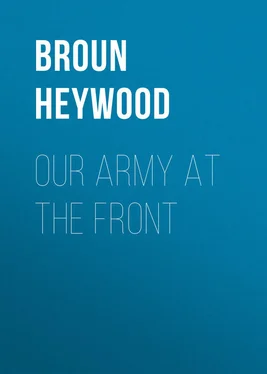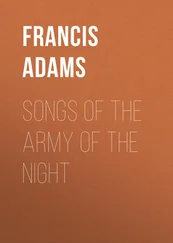Heywood Broun - Our Army at the Front
Здесь есть возможность читать онлайн «Heywood Broun - Our Army at the Front» — ознакомительный отрывок электронной книги совершенно бесплатно, а после прочтения отрывка купить полную версию. В некоторых случаях можно слушать аудио, скачать через торрент в формате fb2 и присутствует краткое содержание. Жанр: foreign_prose, foreign_antique, foreign_language, на английском языке. Описание произведения, (предисловие) а так же отзывы посетителей доступны на портале библиотеки ЛибКат.
- Название:Our Army at the Front
- Автор:
- Жанр:
- Год:неизвестен
- ISBN:нет данных
- Рейтинг книги:5 / 5. Голосов: 1
-
Избранное:Добавить в избранное
- Отзывы:
-
Ваша оценка:
- 100
- 1
- 2
- 3
- 4
- 5
Our Army at the Front: краткое содержание, описание и аннотация
Предлагаем к чтению аннотацию, описание, краткое содержание или предисловие (зависит от того, что написал сам автор книги «Our Army at the Front»). Если вы не нашли необходимую информацию о книге — напишите в комментариях, мы постараемся отыскать её.
Our Army at the Front — читать онлайн ознакомительный отрывок
Ниже представлен текст книги, разбитый по страницам. Система сохранения места последней прочитанной страницы, позволяет с удобством читать онлайн бесплатно книгу «Our Army at the Front», без необходимости каждый раз заново искать на чём Вы остановились. Поставьте закладку, и сможете в любой момент перейти на страницу, на которой закончили чтение.
Интервал:
Закладка:
Inside Field Headquarters, the little bare wooden rooms were stripped of their few battered vases and old chromos, and plain wooden tables and chairs were set about. The marines opened the windows, and scrubbed up the floors, and hung out the sign of "Business as usual," and General Sibert moved in.
The rest was not so easy. The various kitchens came in first for attention. For many days French and American motor-lorries had been trundling across France, storing the warehouses with heaping piles of food-supplies. The procession practically never stopped. Trains brought what could be put aboard them, but it was to motors that most of the real work fell. So the thin, long line of loaded cars stretched endlessly from coast to camp, and finally everything was attended to but where to put the food and where to cook it.
The houses with the good back sheds were picked for kitchens, and the big army soup-kettles were bricked into place, and what passed for ovens were provided for the bakers.
For bathing facilities, there were neat paths marked to the river. That is, the French called it a river. Every American who rides through France for the first time has the same experience: he looks out of his train-window and remarks to his companion, who knows France well: "Isn't that a pretty little creek? Are there many springs about here?" And the companion replies scornfully: "That isn't a creek – that's the Marne River," or "That's the Aisne," or "That's the Meuse." The American always wonders what the French would call the Hudson.
It was one of these storied streams that ran through the American training-camp, in which the Americans did their bathing. Whenever a soldier wanted to get his head wet he waded across.
Later, when the camps were filled, these river-banks were to offer a remarkable sight to the French peasants, who thought all Americans were bathing-mad anyway. Hundreds of soldiers, in the assorted postures of men scrubbing backs and knees and elbows, disported with soap and wash-cloth along the banks. Hundreds of others, swimming their suds off, flashed here an arm and there a leg in the stream itself. It did not take much distance to make them look like figures on a frieze, a new Olympic group. Modesty knew them not, but there were not supposed to be women about, and the peasants had a nice Japanese point of view in the matter. At any rate, there was the training-camp bathtub, and they used it at least once a day, to the unending stupefaction of the French.
Where they slept was another matter, suggesting neither Corot nor Phidias.
The privates had houses first, then barns. The barns were freed of the live stock, which was turned into meadows to graze, and the floors were dug down to clean earth, and vast quantities of formaldehyde were sprayed around. Then the cots were carried up to the second floors of the barns and put along in tidy rows. At the foot of each soldier's bed was whatever manner of small wooden box he could corral from the quartermaster, and there he kept all he owned. His pack unfolded its contents into the box, and his comfort-kit perched on the top. And there he kept the little mess of treasures he bought from the gypsy wagons that rode all day around the outskirts of the camp.
Windows were knocked out, just under the eaves, for the fresh air that seemed, so inexplicably to the French, so essential to the Americans.
Even with the First Division, acknowledged to be about the smallest expeditionary force known to the Great War, the soldiers averaged a little over two thousand to the village, and since not one of the villages had more than four or five hundred population in peace-times, the troubles of the man who arranged the billets were far from light.
Fortunately, the First Division did not ask for luxuries. Even the officers spent more time in simplifying their quarters than in trimming them up. The colonel of one regiment – one of those who became major-generals soon after the arrival in France – had his quarters in an aristocratic old house, set back in a long yard, where plum-trees dropped their red fruit in the vivid green grass and roses overgrew their confines – it was the sort of house before which the pre-war motor tourists used to stop and breathe long "ohs" of satisfaction.
The entrance was by a low, arched doorway. The hall was built of beautifully grained woods, old and mellow of tone. The stairway was broad and easy to climb. The colonel had the second floor front, just level with the tree-tops.
In the room there were rich woods and tapestried walls, and at the back was a four-poster mahogany bed with heavy satin hangings, brocaded with fleur-de-lis. The Pompadour would have been entirely happy there. But the American colonel had done things to it – things that would have popped the eyes out of the Pompadour's head. He pinned up the four-poster hangings with a safety-pin, that being the only way he could convey to his amiable little French servant-girl that he didn't want that bed turned down for him of nights. And he had taken all the satin hangings down from the windows. Under these windows he had drawn up a little board table and an army cot. Beside the table was his little army trunk. The space he used did not measure more than ten feet in any direction, and his luxuries waited unmolested for some more sybaritic soul than he.
A major in that same village who had had a cavalry command before the cavalry, as he put it, became "mere messengers," picked his quarters out himself, on the strength of all he had heard about "Sunny France." His house was nothing much, but behind it was a garden – a long garden, filled with vegetables, decorated with roses, shaded by fruit-trees. At the far end of the garden was a summer-house, in a circle of trees. Here the major took his first guests and showed how he intended to do his work in the open air, while the famous French sunshine flooded his garden and warmed his little refuge.
The one thing it will never be safe to say to any veteran of the First Division is "Sunny France." The summer of 1917, after a blazing start in June, settled down to drizzle and mist, cold and fog, rain that soaked to the marrow.
The major with the garden sloshed around the whole summer, visiting men who had settled indoors and had fireplaces. By the time the warmth had come back to his summer-house it was time for him to go up to the battle-line, and the man who writes a history of the billets in France will get a lot of help from him.
Some of the makeshifts of this first invasion were excusable and inevitable. Some were not. After the first two or three weeks of settling in, General Pershing made a tour of inspection, and some of the things he said about what he saw didn't make good listening. But after that visit all possible defects were overcome, and the men slept well, ate well, were as well clothed as possible, and were admirably sanitated.
The drinking-water was a matter for the greatest strictness. The French never drink water on any provocation, so that water provisions began from the ground up.
It was drawn into great skins and hung on tripods in the shaded parts of the billets, and it was then treated with a germicide, tasteless fortunately, carried in little glass capsules. This was a legacy from experiences in Panama.
Each man had his own tin cup, and when he got thirsty he went down and turned the faucet in the hanging skin tank. If he drank any other water he repented in the guard-house.
So, though the billets were rude and sometimes uncomfortable, the soldiers did stay in them and out of the hospitals.
And there were compensations.
Half of these were in play-times, and half in work-times. The training, slow at first, speeded up afterward and, with the help of the "Blue Devils" who trained with the Americans, took on all the exhilaration of war with none of its dangers. But how they trained doesn't belong in a chapter on billets. How they played is more suitable.
Читать дальшеИнтервал:
Закладка:
Похожие книги на «Our Army at the Front»
Представляем Вашему вниманию похожие книги на «Our Army at the Front» списком для выбора. Мы отобрали схожую по названию и смыслу литературу в надежде предоставить читателям больше вариантов отыскать новые, интересные, ещё непрочитанные произведения.
Обсуждение, отзывы о книге «Our Army at the Front» и просто собственные мнения читателей. Оставьте ваши комментарии, напишите, что Вы думаете о произведении, его смысле или главных героях. Укажите что конкретно понравилось, а что нет, и почему Вы так считаете.












